- Home
- Peter Ackroyd
The Lambs of London Page 4
The Lambs of London Read online
Page 4
“He often mentions lightning. There is that line in Romeo and Juliet—”
His father was not listening to him. He was already searching for another passage with which to impress his son. He loved to recite the drama. He believed that he had a powerful voice, but to William it often sounded hollow and uncertain.
They had once travelled to Stratford “in pursuit of the bard,” as Samuel Ireland had put it. William knew that his father relished the opportunity of travelling away from home; in a temporary separation from the bookshop, and from the watchful presence of Rosa Ponting, he could occupy a more distinguished position in the world. One traveller in the Stratford coach had ventured to enquire, “In what business are you engaged, sir?” Samuel Ireland had looked at him for a moment. “I am engaged, sir, in the business of living.”
They had stayed that evening at the Swan Inn, Stratford, and on the following morning they had called upon Mr. Hart, the butcher who shared Shakespeare’s descent through the female line and who still lived on Henley Street in Shakespeare’s own house. The scholar, Edmond Malone, had given Samuel Ireland a letter of introduction. Outside the old dwelling itself was a sign in black point. “William Shakespeare was Born in this House. NB: a Horse and Taxed Cart to Let.”
“It is an honour, sir,” Hart had said when they entered the narrow passage of the house.
“The honour is mine, sir. To meet one of the family in these surroundings. My son, sir. William.” William shook his hand, which was warm and powerful. He imagined it around the neck of a hare or chicken. Ralph Hart was a short, bald man, of very pale complexion.
“I have no literary gifts, Mr. Ireland. I am merely a tradesman.”
“But an honourable trade.” Samuel Ireland was very gracious. “Was not the bard’s father a butcher?”
“It is disputed. Some say he was a glover. But he kept cattle. Come into the parlour. Some like to call it the hall.” Hart seemed to William to be a composed and determined man; he was sure that he ran a thriving business. “A dish of tea? I have no wife, but a very good housemaid.”
“Invaluable, sir, I am sure.”
It was for William Ireland the strangest sensation—to be in the house where William Shakespeare was reputed to be born, to be sitting in a room through which he had walked a thousand times, to see in the face of this butcher some lineaments of his illustrious family. And yet to feel nothing, to sense no familiar presence, to be stripped of all enchantment—that was most mysterious of all. He blamed his own incapacity. A more sensitive person would no doubt have thrived in this redolent atmosphere. A finer spirit would have been stirred, as if by a trumpet. But he registered nothing. The house was empty.
“You have heard of our latest discovery, Mr. Ireland? His father’s will was found hidden behind a rafter in this house. In the attic, where I keep my old pans.” William looked up, and noticed that the cross-beams of the parlour still displayed hooks for the haunches of meat.
“This is John Shakespeare’s papist will, is it not?” Samuel Ireland lowered his voice slightly on the word “papist.”
“Indeed it is.”
“Yet surely there must be some doubt, Mr. Hart? Might it not possibly be forged by some fanatic?”
“Our friend, Mr. Malone, believes it to be genuine. It is to be published in the Gentleman’s Magazine.”
William noticed a faint flush in the butcher’s pale face, and found himself addressing his father. “Why should it be a forgery, Father?”
“There are some people, William, who might like to claim the father of the bard as one of their own.”
“I am too plain, I suspect.” Ralph Hart helped his guests to more tea. “I believe what I see.”
William Ireland laughed. “I see what I believe.”
Then he noticed that his father was looking oddly at him. He had somehow managed to say the wrong thing, and he felt abashed. He would do anything to please his father. He felt that in some way he had disappointed him, and that he must make amends. How he had disappointed him, he was not sure. It was some general failure. He worked in his father’s business; he was his companion on various bookish expeditions. Yet sometimes he found his father looking at him in surprise, precisely as he had done in Mr. Hart’s parlour, as if he had just discovered that he was part of the household. William Ireland had never known his mother. His father had once told him that she had died when he was quite a baby, but nothing more was said. It was a subject not to be discussed. Rosa Ponting had shared his father’s bed for many years, but William treated her with neither affection nor intimacy. His love was reserved for his father.
SO IT IS REAL , Father? It is genuine?” They were standing over the small parchment, peering at the scrawled signature.
“It is an authentic deed of the time. There can be no doubt about it.”
“Then if you have no doubts, I beg you to accept it as a gift from son to father.”
“Will you take nothing in return, Will? Here is my key.
Have any volume you desire.”
“No, sir. I can accept nothing. It would taint the purity of the gift.”
“Of course this is not to be sold.” The idea of selling the document had never occurred to William. “You should go back to that curiosity shop. Look in its corners. Summon forth its mysteries.”
They could hear Rosa Ponting coming down the stairs. “Whatever are you two boys scheming? I’m sure I’ll be the last to know.” It was her custom to consider Samuel Ireland still a “boy.”
He looked warily at her as she entered the shop. “Nothing whatever, dear.”
William could not bear to see her among the books and parchments. “Father, I must deliver Pandosto before it grows too late.” He had already described Charles Lamb’s purchase to his father.
“Leaving the house at this hour, William?” Rosa tapped her nose. “I hope she is worth the effort.”
He had wrapped the volume in coarse brown paper, and now he took it down from the shelf as if he were using it as a shield against her; he left the shop quickly, muttering “good night” into the air.
LAYSTALL STREET WAS only a short distance from the shop in Holborn Passage. And so, a few minutes later, Mary Lamb opened the door to him.
“I have an appointment with Mr. Lamb.” He was afraid that he had sounded too fierce, and took a step backwards.
“Forgive my intrusion.”
“Do you mean Charles? Charles is not here.”
Her face was in shadow, the oil lamp in the hall shining behind her, but William was drawn to the sweetness of her voice. “I have brought a book for him.” On an impulse he held it out to her. “He purchased it this morning.”
“What is it?”
“Pandosto.”
“Greene’s Pandosto? Oh do come in.” He hesitated on the threshold. “My parents are with me in the drawing-room.” He followed her through the hall, and noticed the rich bronze of her untidy hair. Then he found himself in a small over-heated room, where an old couple were looking up at him in surprise. The man was eating toast, and there was butter on his chin. “My name,” he said, “is Ireland. William Henry Ireland.”
They said nothing. They stared at him so strangely that he might have come from the Sahara or the Antarctic wastes.
“Mr. Ireland has brought Charles a book, Pa.”
Mr. Lamb waved his toast at him and laughed. Mrs. Lamb was not so merry. She did not like surprises of any kind, let alone one in the shape of a red-haired young man bearing books at eight o’clock in the evening. “Charles is not with us, Mr. Ireland. He is engaged.”
“Yet he asked me to bring him this.”
“Do let me look.” Mary took the parcel from him, and unwrapped it.
“The secret is in the inscription, Miss.”
She opened the book at its frontispiece, and repeated the words silently to herself. It was then he noticed the scars upon her face; the pits and ridges of her cheeks were caught in the candle-light. He looked away, and seemed to be
studying the miniatures and cameos displayed on the walls of the little room.
“Why, this is a treasure, Mr. Ireland. It was once owned by William Shakespeare, Ma.”
“That was a very long time ago, Mary.” So her name was Mary. “I wonder at your brother buying such things when he has scarcely money enough for a pair of boots.” Mrs. Lamb turned back to the toast now burning on the fork.
“Did my brother promise to pay you this evening, Mr. Ireland?” She asked him this in a low voice so that her mother could not hear, and for an instant there was collusion between them.
“It was not much—”
“How much?”
“He owes two guineas only. One has been paid.”
“Would you excuse me for a moment, Mr. Ireland?”
As Mary left the room Mrs. Lamb looked at William intently. “Has Charles purchased this book from you, Mr. Ireland? Come back to the fireside, Mr. Lamb.” Her husband had wandered over to William, and was brushing the dust and detritus from his jacket.
“Not exactly.” William hesitated, confused by Mr. Lamb’s attentions. “We agreed—”
“Then I would be obliged if you would take this book away with you.”
“Oh no.” Mary hurried back into the room. “This is a sacred book, Ma. Shakespeare himself turned its pages. Will you not sit with us for a moment, Mr. Ireland?” She came up to him, and slipped two guinea coins into his hand. “Will you take something with us?”
“I am sure Mr. Ireland has better things to do with his time.” Mrs. Lamb was not inclined to be hospitable, but the loud laughter of her husband seemed to tip the balance against her.
“There is port wine in the parlour, Ma. Mr. Ireland is our guest.”
He could scarcely refuse to stay now and, in any case, he felt curiously at ease in Mary’s presence. He sensed that she was innocent of the conventions. She was Charles Lamb’s sister, too, and might provide another means of gaining his acquaintance.
“It was clever of Charles to find it. To find you, I should say.”
“He often passes by.” He had observed Charles on several occasions, staring in the window at the volumes on display. “He came in this morning for the first time.”
“You must be the bookshop in Holborn Passage! Charles has often mentioned it. I envy you terribly, being among such things. Mr. Ireland owns a bookshop, Ma.”
“My father owns it—”
“Do you have a thriving trade?” Mrs. Lamb had suddenly become more interested.
“Thriving is wiving.”
“Not now, Mr. Lamb. Are you an old firm?”
“My father has continued the business for many years.”
Mary Lamb was turning over the pages of Pandosto. “This is a book,” she said to him, “for winter evenings.”
“Yes, Miss Lamb. With the world shut out.”
She kept her head bowed. “This may have been the very book he read before The Winter’s Tale.”
“He read it like a boy gazing on a beach, looking for pretty shells.”
She glanced up at him, astonished. “Have you always loved Shakespeare?”
“Oh yes. When I was quite a child, I used to recite him. My father taught me the words.” William could recall the evenings when he stood upon a table, singing out in a clear calm voice the soliloquies of Hamlet and of Lear. He had been considered to be something of a prodigy by Samuel Ireland’s friends.
“Charles and I would play the parts, too.” While her parents busied themselves about the dying fire, she told him how she and her brother would take on the roles of Beatrice and Benedick from Much Ado About Nothing, or of Rosalind and Orlando from As You Like It, or of Ophelia and Hamlet. They had the words by heart, and would furnish them with all the actions and attitudes that they deemed to be appropriate. As Ophelia Mary would turn away and weep; as Hamlet Charles would stamp his foot and scowl. For her these scenes seemed more real, more serious, than anything that happened to her day by day. “But, for Charles, I believe they were part of a game. Now I am talking too much.”
“Not at all. It interests me exceedingly. You might like to know, Miss Lamb, that I have discovered his signature.”
“What do you mean?”
“That of Shakespeare. It is an old title deed from the reign of James. My father has authenticated it.”
“Is it certainly his hand?”
“There can be no doubt about it.” He noticed how the scars upon her face were a shade whiter than her living skin. “I found it in a curiosity shop. In Grosvenor Square.”
“To possess such a thing—”
“It has often occurred to me that there must be some store of Shakespeare’s papers. The contents of his study and his library have simply disappeared. They are mentioned in no will. Yet his family would have reverenced them.”
“Naturally.”
“They would have been preserved.”
“In Stratford?”
“Who knows where, Miss Lamb?” He sensed some intimacy between them. He did not know from where it had come; it had, as it were, descended upon them. Mary’s father had started singing some old song.
“I have often wondered,” she said, as loudly as she dared, “how Shakespeare would have appeared. In life, I mean.”
“No doubt he was very sane.”
“There is no question of that. Singularly sane.”
“He would have been open, and generous. And honest.”
“He had a spring in his step. No force could keep him down.”
“Of course not. He had that within him—” William’s voice rose higher, but then he faltered. “As you say, Miss Lamb, he was not an ordinary mortal.” The room suddenly seemed to him to be smaller; he had a definite sense of proximity to Mary, and to her parents, even to the miniatures upon the walls.
“Yet he understood what it was to be ordinary, Mr. Ireland, don’t you think?”
“He understood what it was to be anything.”
“There are ordinary people in his plays. There are nurses and prisoners and citizens. But they are ordinary to the point of genius.” He recognised Mary’s loneliness even as she spoke to him; there was so much fervour within her that it could not often have been expressed. “Think of Juliet’s nurse,” she was saying. “She is the essence of all nurses that have been or ever will be.”
“And then there is the porter in Macbeth.”
“Oh yes. I had forgot him. We must make a list of Shakespeare’s ordinaries.” “We” sounded familiar, and she turned at once to her mother. “Wherever can Charles be, Ma?”
“Where he should not be, I imagine.” She took up her needlework with a satisfied sigh of displeasure. Her husband had fallen asleep by the smouldering fire.
“May I play something for you, Mr. Ireland? It will prove a point.” Mary went over to the small piano, in an alcove beside the fireplace, and opened its lid. When she began to play, her fingers scarcely seemed to touch the keys; but the notes of Clementi filled the drawing-room. She continued for a minute, and then turned towards him. “It is pretty, don’t you think? It is exalted. But it gives you no particular meaning. That is how I think of Shakespeare. He is purely expressive. He uses the black and the white. That is all.”
If tears had come into his eyes at that moment, he would not have known the reason. “Will you play some more?”
The music passed over her parents without eliciting any response. But he was excited by it. There was no music in the bookshop; he knew only the tunes of the pleasure gardens and the inns. This was altogether different. It came from another sphere. It sustained his perception of Mary.
There was suddenly a banging at the door. Mary swiftly rose from the piano and went into the hall. Mr. Lamb woke up and asked his wife, “How many more sacks to the mill?”
William suddenly felt himself to be a stranger in the house. He had become an unwelcome visitor. He could hear the voices in the hall.
“I have lost my keys, dear.”
“What has happe
ned to you?”
“I was hit.”
“Hit?”
“The ruffian took my watch and fled. Look at my head. Is it bleeding?”
Mrs. Lamb looked wildly at William, and rose from her armchair. “Whatever is the matter with you, Charles?”
“I have been robbed, Ma.” Charles came into the room and, to William, he seemed triumphant. “Oh Mr. Ireland. I quite forgot. Delighted to meet you again. As you can see, I have been detained.”
“Are you hurt, Charles?”
“No, Ma. I don’t believe so. Have you seen the book, Mary?”
“What has been taken from you, Charles?”
“My watch, Ma. Nothing beside.”
Mary went over to her mother. “It is nothing. Charles is quite well. Compose yourself.” She settled her back into the armchair. “He is not marked. Only his watch has gone.” Mr. Lamb had begun to doze again.
Charles sat down beside William. “I was dining with friends. Otherwise I would have remembered our engagement. And then it happened.” There was, perhaps, a trace of condescension in his voice.
“It is of no consequence, Mr. Lamb. Your parents and your sister have been most hospitable. We heard some music. Are you sure you are perfectly well?”
Charles brushed away the question with a movement of his hand. “Music? You have been fortunate. This is the book, of course.” He took up the copy of Pandosto from the side-table where Mary had left it.
“The same.”
“May I?”
“It is yours now. Your sister has paid the residue.”
“And how did she do that?”
“I have no notion.”
“I do. Our great-aunt left her a small annuity. She picks it up from the West Lothian Bank in Seething Lane. Precious place.”
“You were fortunate, Charles.” Mary had quietened her mother, and now joined them. “You could have been injured.”
“I am always lucky in the London streets, Mary. I lead a charmed life in the city.”
“Do you think he is wise, Mr. Ireland?”
“If that is his experience. Some find it more testing.”

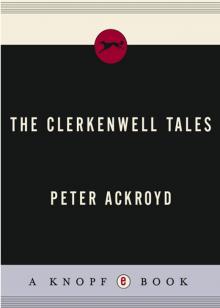 The Clerkenwell Tales
The Clerkenwell Tales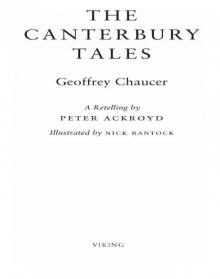 The Canterbury Tales
The Canterbury Tales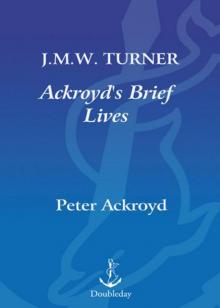 J. M. W. Turner
J. M. W. Turner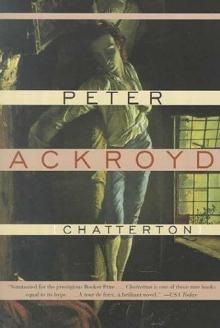 Chatterton
Chatterton The Canterbury Tales – A Retelling
The Canterbury Tales – A Retelling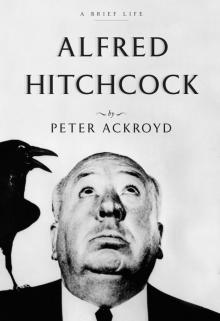 Alfred Hitchcock
Alfred Hitchcock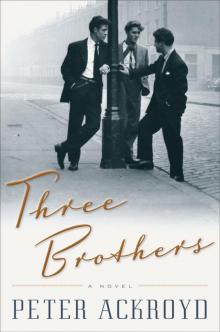 Three Brothers
Three Brothers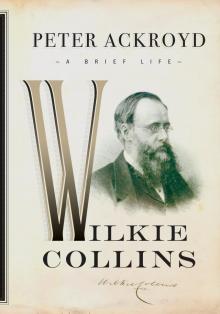 Wilkie Collins
Wilkie Collins Venice
Venice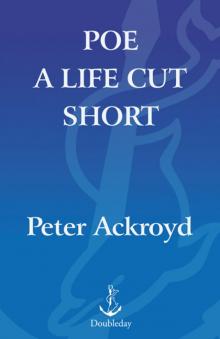 Poe
Poe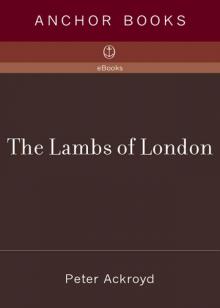 The Lambs of London
The Lambs of London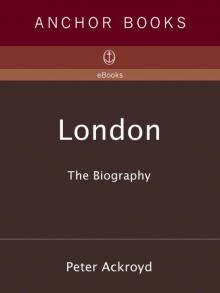 London
London Queer City
Queer City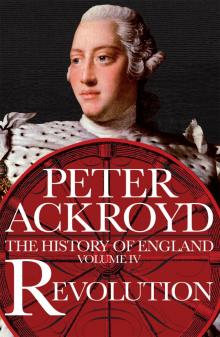 Revolution, a History of England, Volume 4
Revolution, a History of England, Volume 4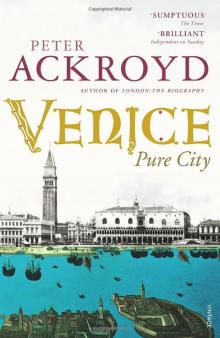 Venice: Pure City
Venice: Pure City Foundation
Foundation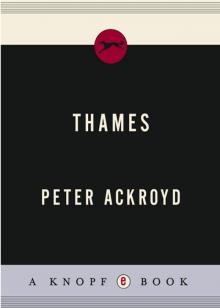 Thames
Thames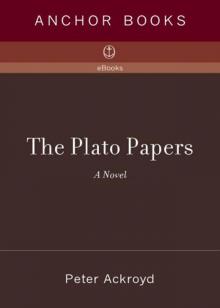 The Plato Papers
The Plato Papers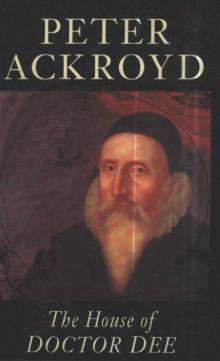 The house of Doctor Dee
The house of Doctor Dee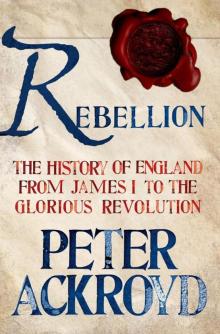 Rebellion: The History of England from James I to the Glorious Revolution
Rebellion: The History of England from James I to the Glorious Revolution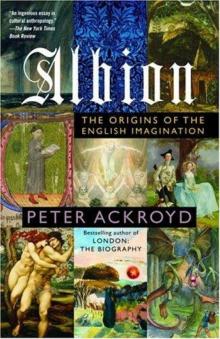 Albion: The Origins of the English Imagination
Albion: The Origins of the English Imagination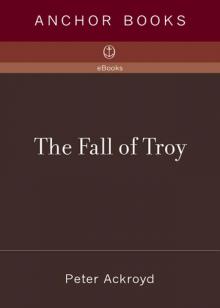 The Fall of Troy
The Fall of Troy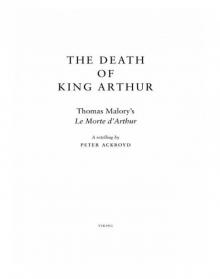 The Death of King Arthur
The Death of King Arthur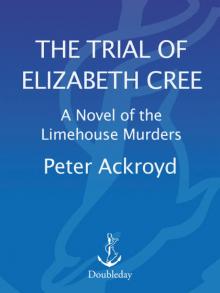 The Trial of Elizabeth Cree
The Trial of Elizabeth Cree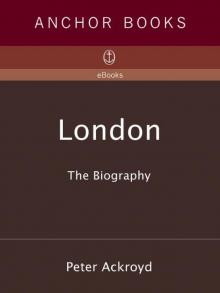 London: The Biography
London: The Biography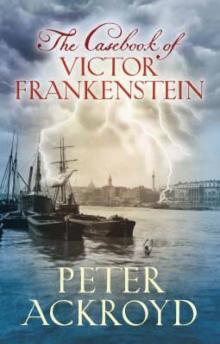 The Casebook of Victor Frankenstein
The Casebook of Victor Frankenstein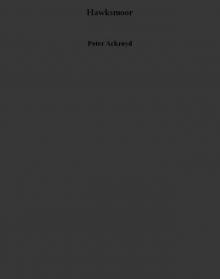 Hawksmoor
Hawksmoor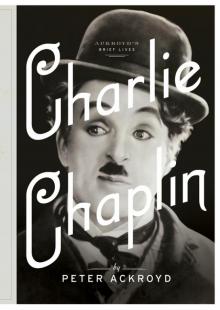 Charlie Chaplin
Charlie Chaplin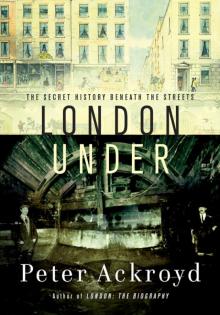 London Under
London Under